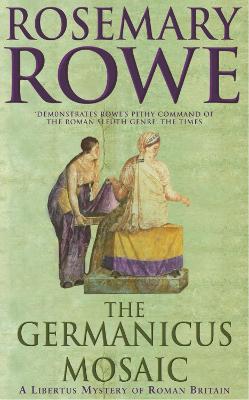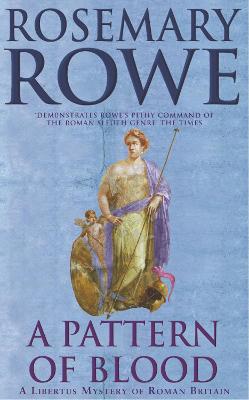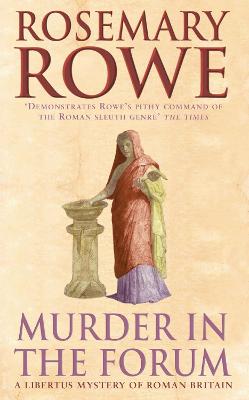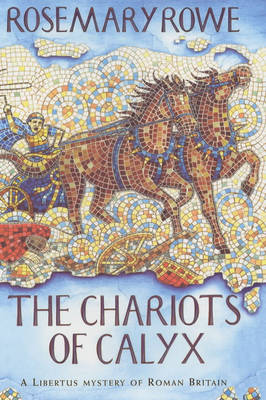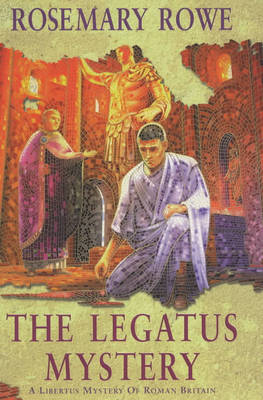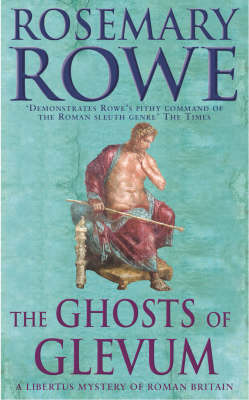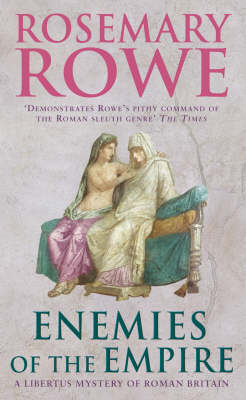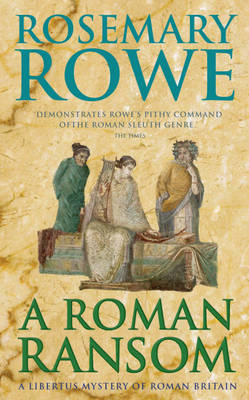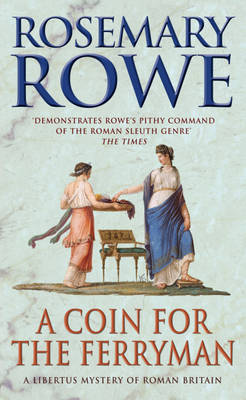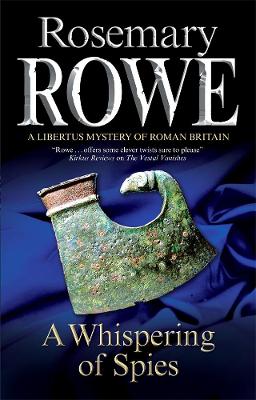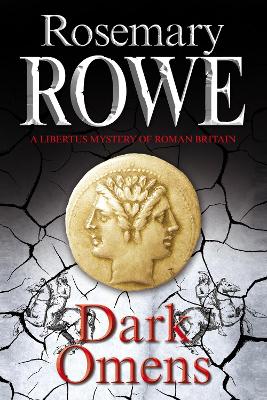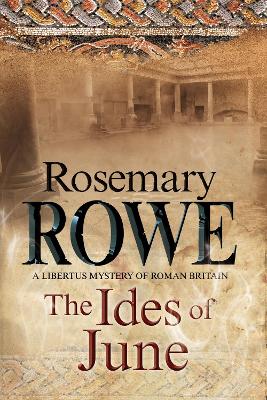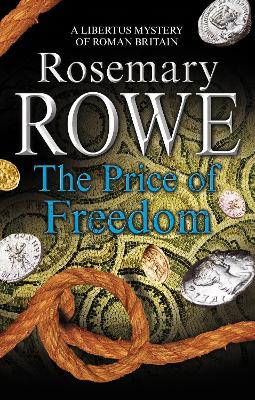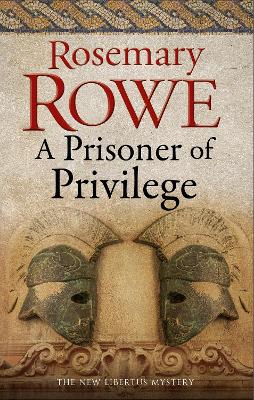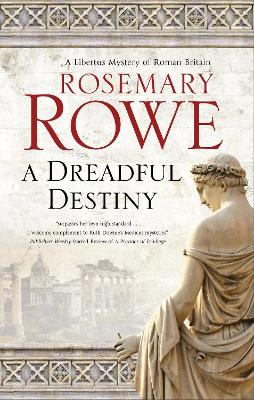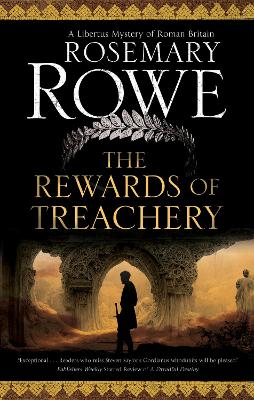A Libertus Mystery of Roman Britain
14 primary works • 18 total works
Book 1
A deadly puzzle from the days of the Roman Empire...
Rosemary Rowe introduces Libertus and Marcus Septimus, in The Germanicus Mosaic, the first fantastic mystery thriller of the highly acclaimed Libertus series. The perfect read for fans of Stephen Saylor and Lindsey Davis.
'Demonstrates Rowe's pithy command of the Roman sleuth genre... a considerable achievement' - The Times
It is AD 186, and Britain is the northernmost province of the hugely successful Roman Empire. In Glevum (modern Gloucester), Libertus, a freedman and pavement-maker, lives under the patronage of Marcus Septimus. When a body is found in the furnace room of a nearby villa, and identified as that of Crassus Germanicus, a retired centurion, Marcus asks for Libertus's help. A slave is missing and the solution to the mystery seems obvious. But Libertus soon discovers that Germanicus has many enemies, and he must use his mosaicist's skill to put together the pieces of a most deadly puzzle.
What readers are saying about The Germanicus Mosaic:
'Has it all: good storyline, interesting characters, historical perspective and a mystery that keeps you guessing all the way through'
'A very likeable and believable hero and cast of characters and some neat plot twists'
'A great introduction to a new detective, with atmospheric settings and an interesting take of Britain under the Romans'
Book 2
Britain is under Roman rule and a killer is at large...
A Pattern of Blood, the second novel in Rosemary Rowe's highly acclaimed Libertus series, investigates multiple murders. Libertus must solve the mystery before the killer strikes again. The perfect read for fans of David Wishart and Lindsey Davis.
'Demonstrates Rowe's pithy command of the Roman sleuth genre... A considerable achievement' - The Times
Pavement-maker Libertus, a former slave who is now a Roman citizen, is not entirely surprised to witness a stabbing near the chariot race ground in bustling Corinium (modern Cirencester). Luckily the victim, the wealthy decurion Quintus Ulpius, has a personal physician on hand and tragedy is averted. Commanded by his patron Marcus Septimus to investigate the attack, Libertus arrives at Quintus's mansion only moments before the decurion is knifed again, this time fatally. When one of Quintus's enemies is found with bloodstains on his toga, for Marcus the case is closed. But Libertus is not at all convinced the solution is that simple. When a second body is found, he knows he must act fast before other lives are threatened - including his own.
What readers are saying about A Pattern of Blood:
'Enjoyed the humour, great puzzle and evocative details of Romano-British life'
'Well researched and the storytelling is excellent'
'Another fine piece of work and an entertaining journey with Libertus'
Book 3
A Roman Emperor lies dead and a mystery is to be solved...
As Libertus investigates a seemingly accidental death, sinister details begin to unravel. Murder in the Forum is the third historical crime thriller in Rosemary Rowe's gripping crime series, in the vein of Lindsey Davis but against a British background.
'Libertus himself is a highly diverting character, the story moves briskly along at chariot pace and there are many diversions along the highways and byways of Roman and Celtic life' - Northern Echo
When Perennis Felix, favourite of the Roman Emperor and would-be enemy of all, heralds his arrival in Glevum (modern Gloucester) with the arbitrary execution of a slave, there are few who dare to question his actions. Indeed, a feast in his honour is universally approved in the cause of self-preservation. Libertus, freedman and pavement-maker, and his patron, Marcus Septimus, are among the reluctant citizens at the celebration. But the festivities come to an end when Felix appears to choke on a nut and dies in front of a stunned gathering. But Libertus suspects that behind Felix's apparently accidental death lies a much more sinister explanation...
What readers are saying about Murder in the Forum:
'This series just keeps getting better'
'Best Libertus yet'
'Fascinating take on Romano-British life as captivating as ever'
Book 4
Book 5
Book 6
Book 7
Book 8
Book 9
Book 13
Gelvum's dignitaries are in a spin. The wealthy Voluus, ex-lictor to the Imperial Governor of Gaul, has decided to retire to the town and invitations have been issued for a welcome feast. How to respond and, more importantly, where do his riches come from? In an effort to find out, Libertus' patron, local magistrate Marcus Septimus Aurelius, asks him to make enquiries.
At Voluus's new apartment, Libertus is informed that one of the ex-lictor's treasure carts has been intercepted, the guards and horses brutally butchered. Events take an even bleaker turn when Libertus' actions are misinterpreted by a network of spies, leading him to be suspected of involvement in the massacre and marched to the garrison to await trial. But after daringly escaping, Libertus embarks on a dangerous quest to discover the truth . . .
Book 14
Meanwhile, at an important feast, the sacrifice is spoiled as an aged priest lets go of the sacrificial ram - and when news arrives that the Emperor is dead, it seems that these dark omens are being realised. The subsequent discovery of not one, but two mutilated corpses only adds to this. Who holds the answer to the mysteries? Everyone had motive; Libertus attempts to solve the mystery against a backdrop of superstitious fear of auguries, and public riots following the confirmation of the Emperor's death.
Book 15
Libertus is passing the villa of his patron, Marcus Septimus Aurelius, when he sees an elaborate travelling carriage which has pulled up outside and is now blocking the road. Recognising that this may be an important visitor, Libertus approaches the carriage, intending to explain that Marcus is away, gone to Rome to visit his old friend Pertinax, who has recently been installed as Emperor. However, for his efforts, Libertus instead receives a torrent of abuse and the carriage-driver almost runs him down as he departs.
Libertus is badly shaken, but goes back to the villa the next day to find out why there was no gate-keeper in evidence to deal with the stranger. There he finds a gruesome discovery: the man is dead and hanging in his hut, and none of the other house-slaves are to be found. Worse things are to follow as news arrives from Rome which will turn the lives, not only of Libertus and his family, but the whole Empire upside down . .
Book 16
An astonishing new order has usurped power in Rome and the reverberations are reaching even to Glevum, where the legion is preparing to depart. Libertus's wealthy patron, until recently one of the most influential men in the Empire, finds himself not only deprived of the privilege and protection he had previously enjoyed, but under actual threat both from the political establishment in Rome and from an anonymous and vindictive enemy much closer to home.
The murder of another councillor, similarly placed, makes the matter urgent. Libertus, whose humbler status affords obscurity, is charged with spiriting Marcus's young family away to a place of safety. But his task will bring problems of its own, as Libertus uncovers a grisly secret and an ancient crime - with ramifications stretching to the present day.
Book 17
The death of a local tax-collector spells trouble for Libertus in this compelling historical mystery.
Having been inveigled into standing for the local curia, responsible for the submission of all local tax, Libertus discovers that any shortfall must be made good by the councillors themselves. So when news arrives that a tax-collector from a nearby outpost has committed suicide, having gambled everything away, Libertus is despatched to make enquiries, in the hope of recovering at least some of the missing revenue. He has also been asked to attend a wedding, in place of his patron, who is expecting a visit from an Imperial Legate.
But the assignment which should have seen Libertus for once treated as an honoured guest begins to take grisly and unexpected turns. As he pieces together the unlikely truth, Libertus finds himself in mortal danger. Freedom, in all forms, is only relative - but there is a high price for it, sometimes paid in blood .
"Rowe's 18th series whodunit surpasses her own high standard . Rowe's series remains a welcome complement to Ruth Downie's Medicus mysteries, which provide a different perspective on Roman Britain" - Publishers Weekly Starred Review
The arrival of a high-ranking spy for the Emperor Severus spells trouble for Libertus in this gripping historical mystery set in 2nd century Britain.
On a misty day in February, CE 194, Libertus, pavement maker by trade and now reluctant councillor, is summoned to meet his patron at the local public baths. Marcus Septimus is concerned because a distant cousin from Rome has announced his impending arrival and Marcus is convinced he is a spy for the Emperor Severus, despatched to Glevum to investigate reports of an 'act of treason.'
Meanwhile, Libertus has concerns of his own. The local money-lender has been seeking his counsel, but before they can meet, a violent and untimely death occurs . and before long Libertus finds himself a prisoner of his new-found rank, fighting for the truth amidst accusations of treason and murder.
An unwelcome proposal of marriage has far-reaching repercussions in this skilfully plotted historical mystery.
April, CE 194. The tensions in the civil-war-torn Empire have come to Glevum now. Libertus's patron, Marcus Septimus, has received a letter from Druscilla Livia, a widowed cousin of his wife, seeking his protection. She has received an offer of marriage from a powerful Roman Senator, Hortius Valens, a man of cruel and unusual tastes, and she is in no position to refuse. She has run away . . . with Hortius in hot pursuit.
This puts Marcus in a dangerous dilemma. If he accepts Druscilla as his ward and prevents the wedding, he offends not only her prospective groom, but also the Provincial Governor to whom Hortius is related. But if he returns Druscilla to the Senator, he offends another of her kinswomen - the Empress herself. Once again, Marcus turns to Libertus for help.
But Libertus has worries of his own. His wife Gwellia has an injured foot, which is now infected and could cost her life. But when one of his own slaves is brutally killed he realizes how perilous the situation has become. Resolving to help Druscilla, he concocts an ingenious plan. But in defying the Senator, Libertus is making a powerful enemy. And even the best-laid plans can go disastrously awry . . .
A stolen valuable is just the beginning of a trail of strange events Junio has to uncover in this skilfully plotted historical mystery set in 2nd century Britain.
Late summer, CE 198. With Glevum an uneasy place since the current Emperor seized power, and with rebel Celts still actively opposing Roman rule, tension remains as Caesar turns his attention to stamping out all remaining threats to his authority.
Junio, Libertus's adopted son, tries to be inconspicuous and focus on his workshop and growing family. This becomes difficult when Libertus's patron, Marcus Septimus, seeks Junio's advice about a valuable cloak-clasp which has disappeared - together with the jeweller who was repairing it.
Unwillingly dragged into investigating this, Junio finds himself faced with a string of murders, betrayal and revenge, and his own small son in dreadful jeopardy! What secret was the missing jeweller hiding? What danger lurks in the ill-omened cave? And what part does the mysterious Celtic visitor who suddenly appears play in this tale of treachery?
